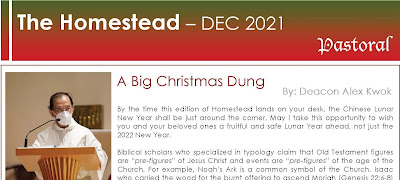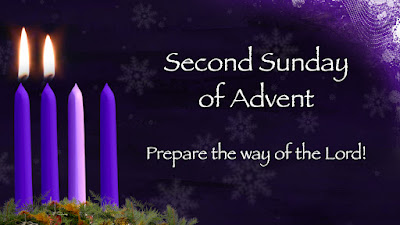Second Advent Sunday, Year C
Theme: Who Is Able To Fill Our Emptiness?
Men were created in the image of God (Genesis 1:26) who is infinite. Therefore, we should also be infinite in some ways. But in reality, our lives are short and we are not able to occupy two or more disconnected spaces at the same time. So, where does our infinity lie? We believe that our souls are immortal. We claim that our imagination knows no bound. For example, there’s a typical theme which the inmates I visited before confided in me. Though they were physically imprisoned within their cells, their minds were free to fly home across the oceans to see their family members! Logically speaking, the love we share with each other should know no boundary too. Yet, for various reasons, we love the lovable and the beautiful more. We admire the outstanding and the successful more. We care for our relatives and friends more. The trouble-makers we ignore. The ugly and the losers we avoid. Our rivals and enemies we hate! How paradoxical! There are a lot of holes in our infinity.
It is the Second Advent week now. Since last week, we should have become alert to the return of our Saviour to judge the living and the dead. This week, we are supposed to repent, i.e. to turn away from sins and turn to God. In the language of the prophets, Isaiah and John the Baptist, we should “Prepare the way of the Lord, make straight His paths. Every valley shall be filled and every mountain and hill shall be made low. The winding roads shall be made straight, and the rough ways made smooth, and all flesh shall see the salvation of God.” (Luke 3:4-6, Isaiah 40:3-5) There is much to meditate and let us begin from the end.
“All flesh shall see the salvation of God” (Luke 3:6, Isaiah 40:5). Yes, all flesh indeed and that is why the Church must be Catholic. The Church should embrace all and rejects nobody. The good Lord says, “Do to others as you would have them do to you. For if you love those who love you, what credit is that to you? Even sinners love those who love them.” (Luke 6:31-32) However, as I previously mentioned above, there are holes in our love. We like to play God and take over God’s job to pass judgment on others. Therefore, some deserve our love and some our wrath …
When we were infants, we were not able to differentiate what is “me” and what isn’t “me”. Psychologists say that it takes time for infants to build up their concept of “self”, the boundaries of their body and lastly their identity and ego. This is a process necessary for infants to grow up. But in the process, all of us lose our “innocence/purity” and become selfish because we feel secure and comfortable living inside this shell, this so called “ego”! The prophet’s proclamations as well as Jesus’ teachings pluck us out of our crust which obscures and blocks God’s grace from penetrating into our souls! Whether we like it or not, God wills all to be saved, including those who have hurt us, those whom we hate and curse! We would be sitting next to each other in the heavenly banquet. Don’t worry. God is fair. Surely we have offended many people who hate us as much as we hate others. If we don’t feel comfortable sitting next to them, I’m sure they would feel the same towards us. How would we take it if we don’t repent and free ourselves of our own prejudices? We need a bigger heart to embrace all the people we encounter, even those whom we hate!
We should be grateful to God every morning when we get out of bed for granting us yet another day to love even those unlovable ones. Why? I believe this is how we prepare the way of the Lord. Surely the prophets are referring to our hearts where there are many valley, mountains, winding roads and rough ways!
There are valleys in our hearts created by dreams unfulfilled, emptiness, listlessness, loneliness, regrets and wants etc. After many defeats, disappointments, failures and frustrations, we are not able to harbour any hope in our hearts. Who is able to fill these valleys up?
There are mountains in our hearts inflated by ambitions, arrogance, greed, thirst for control and vainglory etc. Who is able to make them low?
There are winding roads in our hearts twisted by backstabbing, conspiracies, double-crosses, gossiping and scheming etc. Who is able to straighten them?
There are rough ways in our hearts conditioned by physical abuses, pushing people around, shouting people down, stuns, tortures and violence. Who is able to smooth them?
Let’s be honest. We are incapable of satiating our wants which is bottomless, of humbling our pride and self-inflation, of cherishing purity & simplicity and lastly of being meek and mild in getting what we want. In short, we’re unable to prepare the way of the Lord on our own. So, what is left of us? Without the Holy Spirit, without God’s grace we’re not able to repent. Lord, have mercy on us!
Do we still have faith in the Lord? Not only is our good Lord infinite, but He is also omniscient and He knows perfectly what needs to be straightened. Furthermore, His humanity surely will inspire great confidence in us so that we are able to trust His providence. What’s the best for us? To satisfy all our wants whenever they arise? No because after getting what we want, we would want more. It seems to be very natural but no end will be in sight! A better approach is to make us understand the truth of our nature. That is why He teaches us to embrace the spirit of poverty which is the sure path to return to our Heavenly Father (Matthew 5:3). In poverty, we would not waste our scarce resources on unnecessary wants. We’ll only spend our energy searching for the indispensable --- God!
How does our Lord help us deal with our pride and arrogance? By allowing us to succeed and scale greater heights until we forget Him. Then when we make mistakes and fail, we don’t think of Him who is always with us (28:20). Therefore, He teaches us to mourn (5:4). The society at large promotes achievements and successes and blames losers for their laziness. In passing the bucket to losers and blaming a group of scapegoats, powerful people are able to save their skins but fail to deal with the root of problems. They are still able to maintain their confident look and congratulate themselves of their “successes” … When are we able to shed a drop of tear for our inadequacy as well as our sins and to mourn? The good Lord promises consolation and not condemnation.
The society at large believes in power. For them, “Might is right”. People have turned the society into a metaphorical jungle. Today, it is the law of the jungle that most people follow and not the law of God. But violence brews further violence which brews more violence in revenge. The only way to break this vicious-cycle is mercy (5:7) in our daily life and a willingness to suffer violence for the redemption of abusers (5:10) in time of persecution. During ordinary days, mildness should be the garment of Christians (5:5). The good Lord advocates humility instead of pride, mildness instead of brute, purity and simplicity (5:8) instead of calculations.
Brethren, the Beatitudes are the Lord’s way to help us cultivate a big heart to partake in the Heavenly Banquet. We need to live up to this beatific spirit in this life. How much do we believe in the good Lord? How much do we hope in the and Lord? And lastly, how much do we love Him?
God bless!
Picture Credit: Holy Spirit Catholic Church
2018 Reflection















